Progress | Insidal alloy super stability verification
Author:Institute of Physics of the Ch Time:2022.08.30
Can omniplications keep stable for a long time? What are the physical mechanisms and roots of amorphous material stability? These are important problems for long -term attention in the field of non -crystal alloy materials and physics.
As we all know, the disorderly atomic arrangement of amorphous substances has led to a higher freedom energy compared to the crystal material, and it is in a sub -stability in energy. Different types of amorphous substances will show completely different stability. For example, volcanic glass and amber can stabilize hundreds of millions of years in the harsh physical and chemical environment; For example, the first discovered AU-SI amorphous alloy began to crystalize after 3 hours at room temperature, and the sample was completely crystal after 24 hours. The poor thermal stability will worsen the physical and mechanical properties during the relaxation or aging process, thereby restricting the long -term service and large -scale application of amorphous alloys. Therefore, the stability of amorphous alloys is closely related to the temperature, the higher the temperature, the lower the stability. The most effective means to study the long -term stability of amorphous alloy is to examine the long -term stability near its glass transition temperature (TG). However, because the usual amorphous alloys have high TGs, it will make it difficult and even impossible for the long -term high -temperature annealing experiments in the laboratory for a long time in the laboratory. However, if you find an amorphous alloy material, its TG is near room temperature, and the natural timeliness (that is, room temperature annealing, Room Temperator aging) can be used to study its long -term stability.
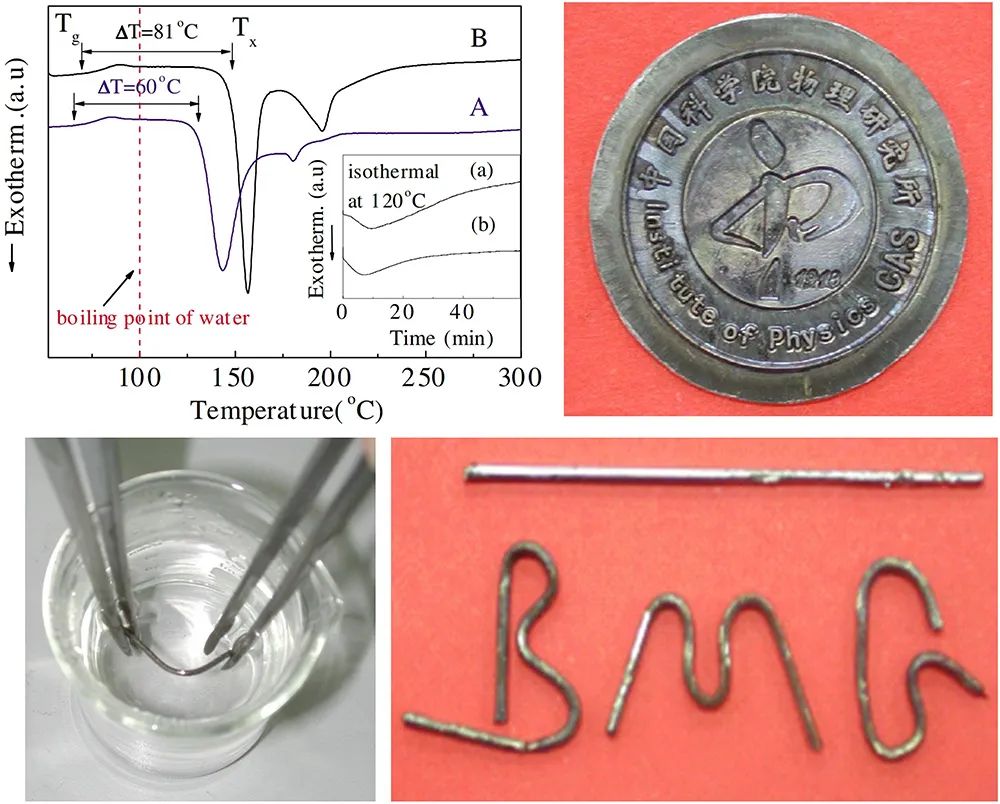
Figure 1. CE-radius alloys with low TG points (~ 67 ° C) can be curved and deforming in boiling water, and it is also called metal plastic.
Zhang Bo and others of Wang Weihua team of the National Research Center of the Beijing Institute of Physics/Beijing Institute of Fresh Conditional Physics in 2005 developed the CE-Map of African Crystal (Figure 1). TG ~ 67 ° C) can be plastic processing in boiling water. Therefore, CE-radius alloys are also called "metal plastic" PHYS. Rev. Lett. 94, 205502 (2005). The characteristics of the low TG point make the CE-fundamental plastic as an ideal material system to study the super long time stability of amorphous alloy. As shown in Figure 2, the lower TG points make the aging effect of the room temperature particularly significant on the CE-mathematical omnidirectional alloy. The aging of CE-radical alloy at room temperature is equivalent to annealing at high temperatures at 0.85TG. This is far from high. The aging effect of other amorphous alloys at room temperature, such as ZR-Ratinoma, aging at room temperature equal to its annealing at 0.45TG. Theoretically, the significant aging effect of the CE-rated non-crystal alloy room temperature can allow it to perform unlimited long-term aging experiments in the appropriate annealing temperature window, which is impossible to obtain by other high TG at amorphous alloy systems.
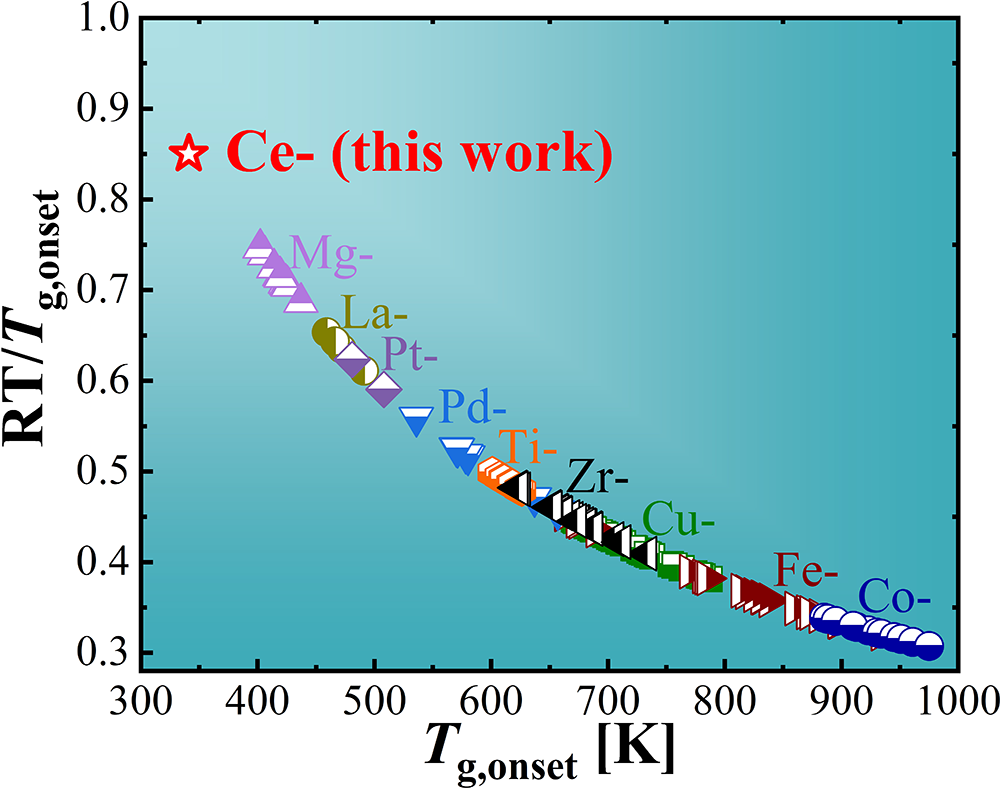
Figure 2. The aging effect of CE-radical alloy at room temperature is significantly stronger than other amorphous alloy systems.
The Institute of Physics of the Chinese Academy of Sciences and the Songshan Lake Materials Laboratory studied the stability of the CE-Facial Plastics at a length of 17.7 years under 0.85TG. Alloy has never had previous studies. The experiment found that the CE-radical amorphous alloy sample after high-time and high temperature aging still maintains a perfect amorphous state (Figure 3A-B), showing a strong anti-crystallization ability, breaking the traditional poor stability of the non-crystal alloy stability. Knowing. As shown in Figure 3C-D, the TG point of the CE-radical amorphous alloy after aging has increased by 27K, and the blurring temperature TF drops by 46K, which shows that its dynamic stability and thermodynamic stability have been significantly improved at the same time. Time aging makes it a super -stable and large non -crystal alloy. Further pass
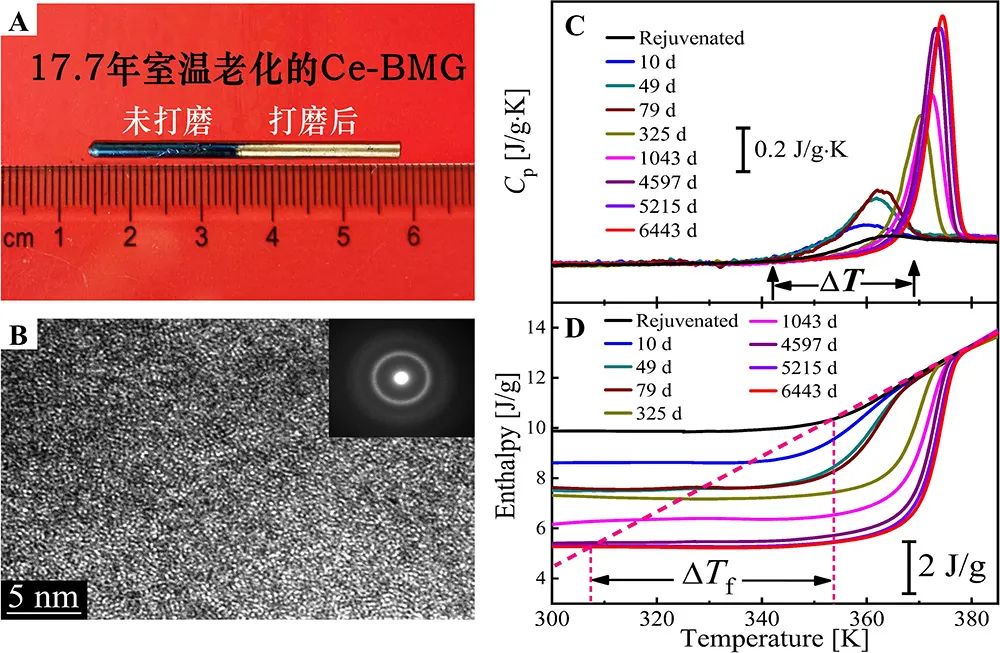
Figure 3. CE70AL10CU20 room temperature (0.85TG) still presents a perfect amorphous state after 17.7 years, and its thermodynamics and dynamic stability have significantly improved, showing a high stability that can be comparable to amber.
How is the super stability of the CE-radical alloys achieve? The analysis found that the acquisition of CE-base super-stable non-crystal alloys is closely related to its strong crispy characteristics. The dynamic brittle value of CE-radius alloys is between 20-30 and is a typical strong liquid glass system. Generally, the energy potential chart of the strong liquid has a large energy valley and the energy potential of the weak liquid is composed of multiple different energy valleys, which means that the micro -power of the strong liquid is relatively uniform. As shown in Figure 4B-C, strong liquid characteristics enable CE-rated amorphous alloys to continue to reach a lower energy state through the transition between the small canal in the process of aging aging. The relaxation rate of the crispy organic glass IMC (M ~ 82.8) and PS (M ~ 116) in Fig. Essence
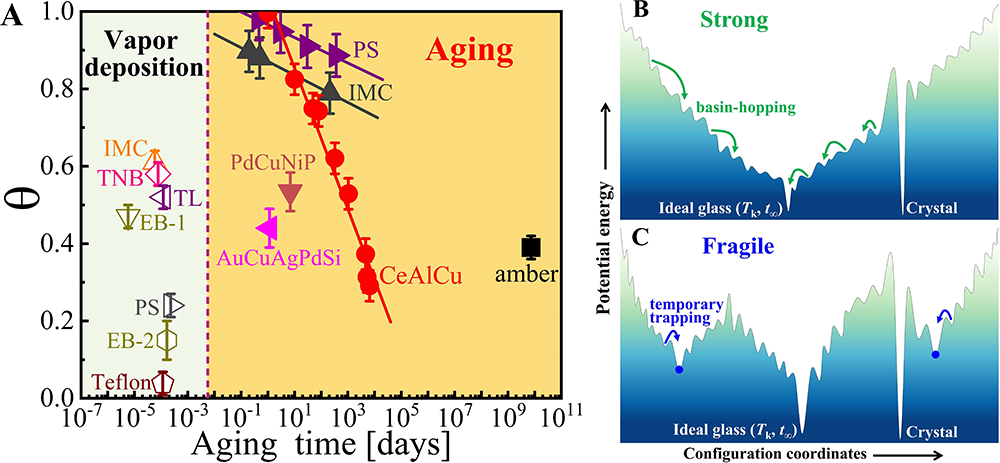
Figure 4. (A) Thermodynamic stability θ (=) obtained by coating or aging of ultra -stable glass. (B) Comparison of energy maps of strong liquid and (C) crispy liquid. The CE70AL10CU20 is a strong glass system, which helps it continuously and quickly relax and relax.
Strong crispy characteristics can ensure the rapid relaxation of the CE-radio alloy close to the ideal glass state. Essence According to the classic nuclear theory, we compared the format nuclear rate of CE-radical amorphous alloys and other alloy systems. It is found that strong liquid characteristics and large TRG values prompted the CE-radius omnipotent alloy to have a extremely low nuclear rate (Figure 5), showing a strong anti-formation capacity comparable to amber. In addition, through the ultra-stable CE-radio alloys, it helps us to explain some classic glass physical science issues. This supports the view that the glass will only become a nuclear crystal after the relaxation is completely over. Figure 5. CE70AL10CU20 is compared with other vitrea system. The low nuclear rate of the CE-radius alloys can effectively hinder its nuclear crystallization, which has significant high heat stability.
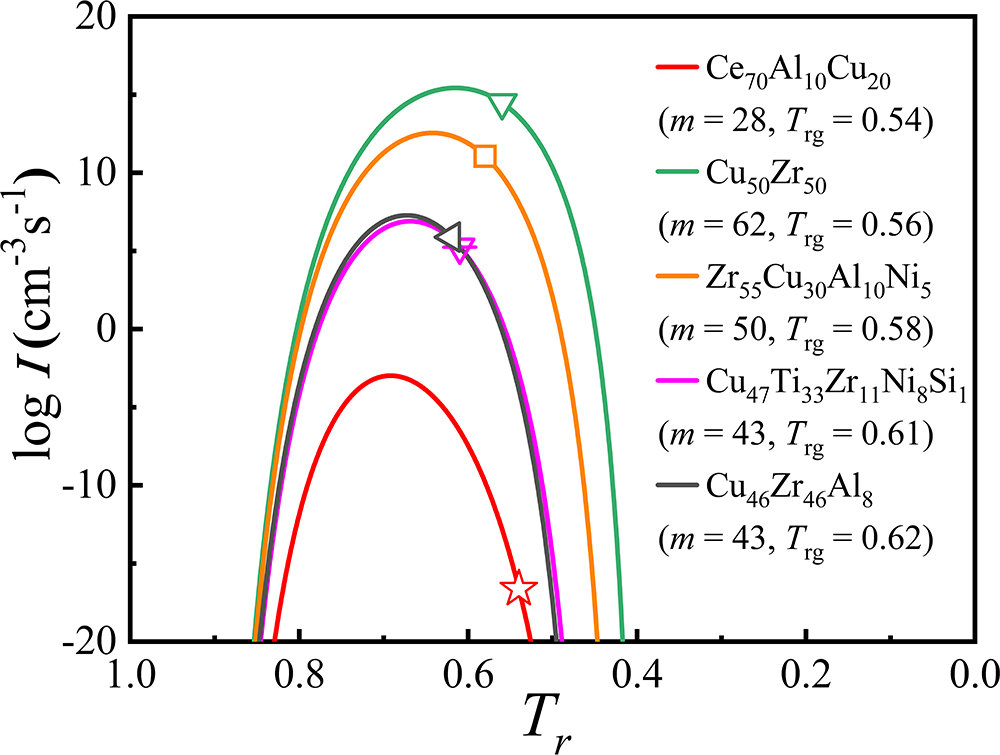
The relevant results were published in the Science Advances journal with the title of "Ultrastable Metallic Glass by Room Tempeature Aging". The Institute of Physics of the Chinese Academy of Sciences and the Songshan Lake Materials Laboratory jointly trained Zhao Yong, a postdoctoral post, as the first author of the dissertation. The Institute of Physics of the Institute of Physics of the Chinese Academy of Sciences and Zhang Bo Researcher Zhang Bo and researcher Ke Haibo as the common communication author of the paper. This work has received major special projects (No. 2019B030302010), National Key R & D project (2021YFA0716302), National Natural Science Foundation of China (No. 52101199 and No. 52071222), and China Space Institute of Space. Laboratory Space Exploration Project (No. TKTSPY-20120-03-02), and the strong support of the Guangdong Provincial Basic and Application Basic Research Project (No. 2021B1515140005).
Thesis link: https://www.science.org/doi/10.1126/sciadv.abn3623
Edit: lychee jelly
- END -
The "National Biography Brand Planning" special seminar was successfully held

On August 4, 2022, the fourth phase of science and technology communication cross ...
Salary is reduced for more than 100 hours a week?Nature: 65%of the post -doctoral after PUA

Text | China Science News reporter Zhang QingdanWhat spam did you send me yesterda...